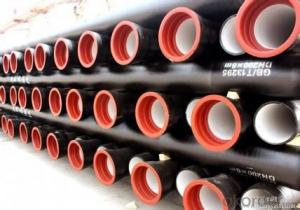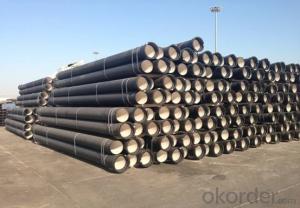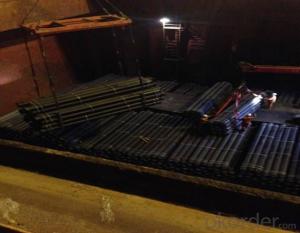DUCTILE IRON PIPE C Class DN150
- Loading Port:
- China Main Port
- Payment Terms:
- TT OR LC
- Min Order Qty:
- -
- Supply Capability:
- -
OKorder Service Pledge
OKorder Financial Service
You Might Also Like
Ductile Iron Cast Pipe is without any defects compare with tradition casting tech, which has many advantages particularly as follow:
(1) High density. In the "vertical upward casting" process, the melt iron of centre liquid column in center crystallizer is continuously feeding for volume shrinkage caused by condensation tube at outer circumference , which lead to be free of shrinkage porosity.
(2) High purity. When melt iron pouring, the mixed impurities such as gas, dross, sand grain which are lighter than melt iron could be eliminated at furnace mouth, its impossible to enter into the crystallizer through the channel, so the melt iron into the crystallizer is very pure.
(3) Strength with toughness. The cooling speed provided by continuous crystallizer is 30 times than sand casting and 5 times than centrifugal casting, and doesn't produce white iron, the eutectic cell volume of continuous cast iron is one eighth to one tenth compare with traditional cast iron. The density of graphite nodule in ductile iron can reach 300-700 pcs/mm2. Therefore, all reason above improve the strength and toughness of continuous cast iron.
(4) Free machining. The high speed cooling make the hardening phase (such as boride, steadite) not appear like reticular, massive or thick, but diffuse like fish bone and pane in shape, moreover, there are tiny graphite flakes inlaid hardening phase. It's free machining in BrinellHardness the range of 250-300HB. However, the Brinell Hardness of 250 is top limit to common metal materials.
(5) Uniform composition of tube wall. The convection mixing of liquid column caused by marching type drawing in crystallizer make the composition of tube wall well-distributed, and concentration gradient very little.
(6) High productivity. To the wall thickness of tube under 10mm, the speed of continuous casting is 1 meter/min, to the wall thickness of tube under 20mm, the speed of continuous casting is 0.5 meter/min, which is high efficiency that centrifugal or other casting tech couldn't reach.
- Q:What is the expected corrosion rate of ductile iron pipes?
- Several factors can influence the expected corrosion rate of ductile iron pipes, including the specific environment in which they are installed, the pH and composition of the water or soil they come into contact with, and the presence of any corrosive substances or chemicals. Compared to materials like cast iron or steel, ductile iron pipes are well-known for their excellent resistance to corrosion. This is because they naturally develop a protective layer called a passive film on their surface when exposed to oxygen in the environment. This passive film acts as a barrier, preventing further corrosion. However, it is important to acknowledge that even ductile iron pipes can experience some degree of corrosion over time, especially in aggressive or highly corrosive environments. The expected corrosion rate can vary from very low to moderate, depending on the aforementioned factors. To ensure the durability and performance of ductile iron pipes, it is advisable to follow proper maintenance and monitoring practices. This includes regular inspections, cleaning, and the application of protective coatings or linings when necessary. Furthermore, implementing a cathodic protection system can further enhance the pipes' corrosion resistance. Ultimately, consulting experts and professionals in the field of corrosion and pipe materials is crucial for accurately determining the expected corrosion rate of ductile iron pipes in a specific application or environment.
- Q:Can ductile iron pipe be used for water treatment plant sludge handling?
- Yes, ductile iron pipe can be used for water treatment plant sludge handling. Ductile iron pipe is known for its strength and durability, making it suitable for handling various types of fluids, including sludge. It can withstand the corrosive nature of sludge and is resistant to abrasion, which is important in a sludge handling system. Additionally, ductile iron pipe has a smooth interior surface, which helps to prevent clogs and allows for efficient flow of the sludge. Overall, ductile iron pipe is a reliable choice for water treatment plant sludge handling.
- Q:How much is the manual installation fee of ductile iron pipes from 100 to 150 per metre?
- Upstairs said 9 yuan per meter, about the same, if you use the special (ductile iron pipe installation tool) construction greatly saves the labor cost, very fast and convenient, can search, is a special tool for the new, I hope to help you.
- Q:How does ductile iron pipe perform in areas with high soil erosion?
- Ductile iron pipe is known for its exceptional strength and durability, making it a reliable choice for areas with high soil erosion. Its unique composition, which includes graphite nodules, allows it to be both flexible and resistant to fractures or cracks, even in challenging environments. This makes ductile iron pipe highly capable of withstanding the impact of soil erosion. In areas with high soil erosion, the soil particles can scrape against the surface of the pipe, potentially causing abrasions or damage. However, ductile iron pipe's thick wall thickness and corrosion-resistant coating provide an effective barrier against these abrasive forces. This means that even in areas with significant soil erosion, ductile iron pipe can maintain its structural integrity and functionality. Moreover, ductile iron pipe's ability to resist corrosion further enhances its performance in areas with high soil erosion. Soil erosion often leads to an increased presence of moisture, which can accelerate the corrosion process of certain materials. However, ductile iron pipe's protective coating, typically made from zinc or epoxy, acts as a shield against corrosion, ensuring its long-term performance and reliability. In summary, ductile iron pipe demonstrates excellent performance in areas with high soil erosion due to its strength, flexibility, and resistance to fractures or cracks. Its thick wall thickness and corrosion-resistant coating make it highly durable against abrasive forces and corrosion, allowing it to withstand the challenges posed by soil erosion. As a result, ductile iron pipe is a dependable choice for infrastructure projects in such areas, providing long-lasting and efficient water and wastewater transportation systems.
- Q:Can ductile iron pipes be made of flexible waterproof sleeves?
- Flexible waterproof casing is suitable for pipeline through the wall in vibration or by strict waterproof requirements of the structures of hardware fittings, general production enterprises according to the Construction Science Research Institute developed S312, 02S404 standard atlas manufacturing. The wall of flexible waterproof casing wall, in case of non concrete should be replaced by concrete walls, and a casing must be solidified on the wall; flexible waterproof casing application widely used in construction, chemical industry, iron and steel, tap water, sewage treatment and other units.
- Q:What are the advantages of cast iron pipes?
- Ductile iron pipe is under high water pressure, can resist the external load change and adapt to the geological conditions, the pipe has the advantages of high strength, good toughness, corrosion resistance, convenient installation, flexible interface, strong shock resistance, low labor intensity, can be applied to the poor geological location and across the road, without additional processing pipe, and then with strong corrosion resistance, and can be applied to coastal saline alkali area. At present, it is widely used in underground pipeline project. Large pipe installation project can reflect the advantages of convenient installation and low labor intensity.
- Q:Can ductile iron pipe be used for marine applications?
- Ductile iron pipe is suitable for marine applications due to its high strength, durability, and resistance to corrosion. This type of cast iron possesses properties that make it ideal for use in various marine environments, including those with saltwater. Marine applications commonly utilize ductile iron pipes for tasks such as seawater intake and outfall systems, offshore oil and gas platforms, submarine pipelines, and marine dredging projects. The corrosion-resistant nature of ductile iron protects against the harsh conditions found in marine environments, including corrosive saltwater, tidal currents, and marine organisms. Furthermore, ductile iron pipes have excellent mechanical properties, including high tensile strength and impact resistance, which further enhance their suitability for marine applications. In conclusion, ductile iron pipe is a reliable and cost-effective choice for a wide range of marine applications.
- Q:Can centrifugal cast iron pipe be galvanized or coated with asphalt which is good for corrosion prevention?
- The centrifugal ductile iron pipe has the advantages of zinc coating and asphalt coating, and it is used in combination with two. By spraying zinc and epoxy coal tar coating of ductile iron pipe wall (or epoxy resin paint, polyurethane, etc.) wall using Portland cement (or epoxy powder, epoxy, polyurethane, ceramics etc.) wall coating can effectively active substances in soil and the formation of an insoluble zinc salt protection tube, the internal coating can inhibit corrosion of pipe body fluid medium.
- Q:Can ductile iron pipes be used for underground mining applications?
- Yes, ductile iron pipes can be used for underground mining applications. Ductile iron is a strong and durable material that can withstand the harsh conditions and heavy loads associated with mining operations. It has excellent resistance to corrosion and is able to handle high pressure and temperature environments. Additionally, ductile iron pipes are flexible and can be easily installed and maintained, making them suitable for underground mining applications where mobility and adaptability are important. Overall, ductile iron pipes are a reliable and cost-effective choice for underground mining operations.
- Q:What are the common methods for flow control in ductile iron pipes?
- There are several common methods for flow control in ductile iron pipes. One of the most commonly used methods is the installation of valves. Valves can be used to regulate the flow of water or other fluids through the pipes. They can be manually operated or automated, depending on the specific needs of the system. Another method for flow control in ductile iron pipes is the use of flow restrictors or flow limiters. These devices are installed in the pipes to reduce the flow rate and ensure that the system operates within its designed parameters. Flow restrictors can be useful in situations where the flow needs to be controlled to prevent damage or to optimize the efficiency of the system. Flow control can also be achieved through the use of pressure regulators. These devices are installed in the pipes to maintain a specific pressure level within the system. Pressure regulators can help prevent excessive pressure, which can lead to pipe bursts or other damage. They can also help maintain a consistent pressure throughout the system, ensuring that the flow is controlled and predictable. Additionally, flow control can be achieved through the use of flow meters. These devices are installed in the pipes to measure the flow rate of the fluid passing through them. By monitoring the flow rate, operators can adjust valves or other flow control devices to ensure that the flow is within the desired range. Flow meters are particularly useful in applications where accurate flow measurement is crucial, such as in industrial processes or water distribution systems. Overall, the common methods for flow control in ductile iron pipes include the use of valves, flow restrictors, pressure regulators, and flow meters. These methods can be combined or used individually depending on the specific requirements of the system.
1. Manufacturer Overview |
|
|---|---|
| Location | |
| Year Established | |
| Annual Output Value | |
| Main Markets | |
| Company Certifications | |
2. Manufacturer Certificates |
|
|---|---|
| a) Certification Name | |
| Range | |
| Reference | |
| Validity Period | |
3. Manufacturer Capability |
|
|---|---|
| a)Trade Capacity | |
| Nearest Port | |
| Export Percentage | |
| No.of Employees in Trade Department | |
| Language Spoken: | |
| b)Factory Information | |
| Factory Size: | |
| No. of Production Lines | |
| Contract Manufacturing | |
| Product Price Range | |
Send your message to us
DUCTILE IRON PIPE C Class DN150
- Loading Port:
- China Main Port
- Payment Terms:
- TT OR LC
- Min Order Qty:
- -
- Supply Capability:
- -
OKorder Service Pledge
OKorder Financial Service
Similar products
New products
Hot products
Related keywords


























